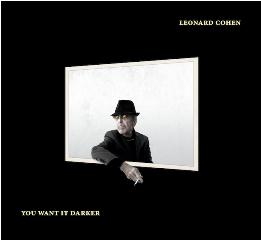Leonard Cohen – You Want It Darker (2016)
Leonard Cohen – You Want It Darker (2016)

1. “You Want It Darker” 2. “Treaty” 3. “On the Level” 4. “Leaving the Table” 5. “If I Didn’t Have Your Love” 6. “Traveling Light” 7. “It Seemed the Better Way” 8. “Steer Your Way” 9. “String Reprise/Treaty” Two of the tracks feature a collaboration between the Cantor of Congregation Shaar Hashomayim and the Shaar Synagogue Choir conducted by Roi Azoulay.
Leonard Cohen's 14th studio album feels like a pristine, piously crafted last testament, the informed conclusion of a lifetime of inquiry.
Leonard Cohen has been bidding his farewell for decades, since before we ever met him. In 1966, he opened Beautiful Losers—his mystical, lysergic, gleefully obscene second novel—with the sunset plea, “Can I love you in my own way? I am an old scholar, better-looking now than when I was young. That’s what sitting on your ass does to your face.” He was just 32 then, rakish without ravaging, not yet celebrated for pairing wry, elegant sacrilege to folk melodies—a year before courting “Suzanne,” 18 from raising his “Hallelujah.” But even then, he was conscious and deferential to the light waning around him.
Which is a placidity his followers don’t always share; what other 82-year-old artist could possibly acknowledge his impending mortality and alarm his fans enough to recant? After The New Yorker’s remarkable recent profile quoted him as “ready to die”—depicting a mentally dexterous, physically frail ascetic “confined to barracks” in Los Angeles, solemnly tidying his affairs—Cohen took pains to console his fans, with familiar drollness: “I’ve always been into self-dramatization. I intend to live forever.” But even as he demurs, it’s hard not to play his 14th studio album, You Want It Darker, and hear a pristine, piously crafted last testament—a courtly act of finality that extends to the title. (Notice it’s not a question; it’s a prescription.)
Cohen has always kicked up his heels in the ambiguities of love and spirituality—casting prayers to the carnal, getting off on enlightenment. And so this new darkness he offers has dimensions instead of declaratives—it feels, in turn, to lyrically reference the encroaching blackness of death, the insularity of plumbing the soul ever-deeper, a fresh fatalism toward the spinning world. “I’m leaving the table/I’m out of the game/I don’t know the people/In your picture frame,” he laments, achingly, on “Leaving the Table,” over a warm and minimal waltz. Later, he intones, “I’m traveling light/It’s au revoir/My once so bright/My fallen star” (“Traveling Light”). It’s delivered with a wink, and no more dramatically brooding than his past work, but it is inescapably morbid; every track is vivid yet still enigmatic as it conjures loss and lamentation of some variety.
This darkness also apparent in the newly fathomless boom of his baritone, which already stripped the floorboards on recent albums Old Ideas and Popular Problems. Whereas the rough edges of his younger, nasal reediness suggested chic bohemian nonchalance, now his low caroling is edged in defiance, and Darker’s production is singularly complementary to it. When he imagines, not so subtly, the stars above him losing light (“If I Didn’t Have Your Love”), his intoning dips below cherubic organs, hinting at what these enamored lyrics soon reveal—that this bright devotional is of the spiritual sort, hewing closer to his past career as a monk than as an Olympic-level ladies’ man. (The most jarring thing about Darker is how utterly devoid of lust it is.) The gracious, spare production adds to the spell—contributed by his son, Adam Cohen, who almost wholly replaces his father’s proclivities for tinny keyboards and stately, gospel-esque female harmonies in favor of violins, warm acoustic guitar, and a cantor male choir. The elder Cohen’s familiar scaffolding of flamenco-influenced guitar remains, a bridge to history.
Cohen is not a songwriter who panders; he speaks above us, sometimes quite literally to higher forms, but also to universality instead of common denominator. Topicality, to him, remains somewhere around the Romantic era. But Cohen is also keen to experiment here. He embraces spry, rootsy bluegrass strings on “Steer Your Way,” which nods back in a few directions—to his college stint in a country band, to 1971’s Songs of Love and Hate (which featured Charlie Daniels on fiddle), to brighter moments on Popular Problems. The album’s final track, for the first time, is a string reprise; it bows out “String Reprise/Treaty,” Cohen’s difficult conversation with his higher power (“I wish there was a treaty we could sign/It’s over now, the water and the wine/We were broken then, but now we’re borderline”) with delicate, mournful dignity.
The album’s heart is exposed early, and plainly, in the title track. Its religious tones veer toward disdainful (“If you are the dealer/I’m out of the game/If you are the healer/I’m broken and lame”) but his oaky growl quickly becomes rapturous. Three times, as the choir drops out, he chants, “Hineni Hineni”—a Hebrew cry of devotion, the reply of a ready worshipper who hears their calling from God and is ready to act in service. Often, it’s the service in the afterlife. His is not a yelp of fervor, or excitable in any shade; the moment is his most quaking, sunken baritone delivery on the album—so deep, it would sound sinister without such compassion imbuing it. It’s the informed conclusion of a lifetime of inquiry. Hopefully, it is one holy dialogue of more still to come. But in this moment, he sounds satisfied; he has loved us in his own way, and he is ready for what awaits him next. But that doesn’t mean we are. --- Stacey Anderson, pitchfork.com
download (mp3 @320 kbs):
yandex 4shared mega mediafire cloudmailru uplea ge.tt
